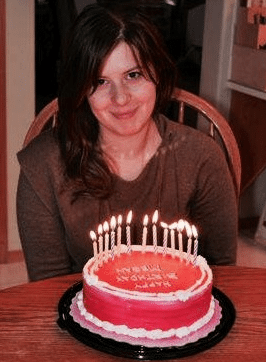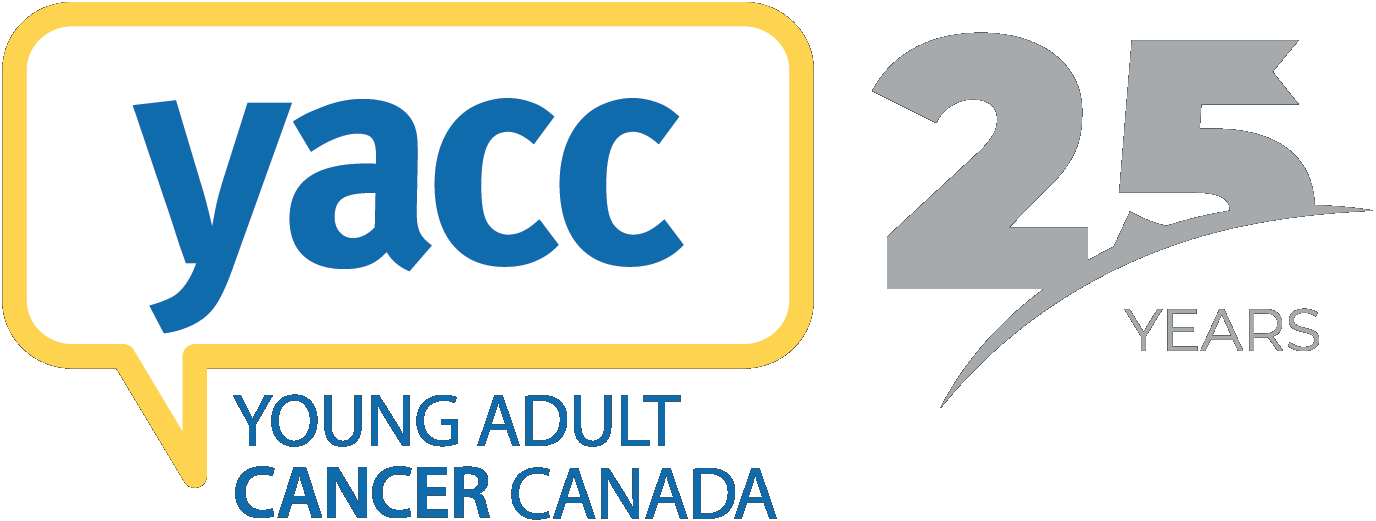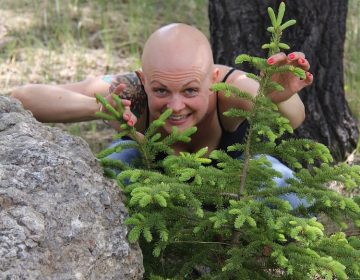
Megan Campbell
Sadly, Megan passed away in July 2017. We will remember her sweet nature, contagious spirit, and desire to help others. She leaves a huge legacy here at YACC, and her impact will help change the lives of other young adults affected by cancer in Canada.
Name: Megan Campbell
Age: 27
City: Edmonton, AB
What is your diagnosis?
Stage IV colon cancer (a.k.a. incurable/terminal)
What year was it? What was your age at the time?
I was officially diagnosed on November 26, 2015 when I was 25-years-old.
What is a top item on your life to do list?
To LIVE! I would also love to obtain a continuous teaching contract.
What are your hobbies?
I love the theatre, reading, painting, photography, nature, traveling, watching classic films, yoga, Pilates, rock climbing, playing the guitar, and curling — just to name a few!
Your diagnosis:
What was your life like before your diagnosis?
I was a busy individual. I just obtained a new teaching position (new school and different grade) and I was doing my absolute best to make a good impression. I was working nonstop with early mornings and late evenings. I was really happy with my new job and I felt like I was making a difference in my students’ lives.
How did you find out you were sick? What led to your diagnosis?
During the month of November, I was tired all of the time and I didn’t have an appetite, which was normal for me during that month because it was report card time, so I thought nothing of it. The only thing that made me go and see a doctor was when I started having a consistent burning and stabbing pain underneath my right rib. At first I thought the pain was from an intense workout that I was doing, but when the pain became more prominent, that’s when I listened to my body and knew that something was up.
After seeing a doctor, I was told that I had the symptoms of having a gall bladder attack, so they sent me to the emergency room to undergo blood work, X-rays, and an ultrasound. The results showed that my liver enzymes were over the roof and there were a lot of spots on my liver and left adrenal gland. I was sent home for the night and was promised to be contacted soon for more medical tests.
The next day, the hospital told me to come in for a CT scan. I was so dehydrated and I couldn’t keep anything down. I remember it was so difficult to drink the contrasting solution and I had to do it in such a short span of time. The nurses had a heck of a time finding a vein for the IV that I felt like a pincushion. The results of the CT scan confirmed a growth on my adrenal gland and many spots throughout my liver. My family and I spoke to a liver specialist and he informed us from the look of the scans, and from his experience, that it was most likely cancer. He booked me for an immediate liver biopsy and it was confirmed, I had cancer. But that was just the beginning.
A team of doctors informed me that my liver cancer was just a secondary source and that they needed to find the primary source as soon as possible. So more tests were booked, and after having a gastroscopy and a colonoscopy, they discovered thousands of polyps and a 20 cm long mass in my colon. I was soon registered to the Cross Cancer Institute where my oncologists informed me that I had Stage IV colon cancer.
A couple of months after being diagnosed, I saw a genetics counsellor to see if there was a possibility of having FAP (Familial Adenomatous Polyposis — where polyps form in the colon and can develop into cancer) and the BRCA1 gene (the potential of having breast and ovarian cancer). It was important for me to find out if I carried these genes so that my family members could be tested immediately in order to avoid what I was going through. Low and behold, I was 100 per cent positive for both. Although I already have colon cancer, I’m now a part of a high risk screening process for breast and ovarian cancer.
What were your first thoughts when diagnosed?
My first thought was, “Like mother like daughter.” My biological mother passed away from various cancers when I was two-years-old. My second thoughts were, “Is this really happening!?” and “Wake up! It’s just a bad dream!”
In which hospital are you treated?
The Cross Cancer Institute
What did your treatment consist of?
My oncologists told me that my tumors were inoperable and that I had two to three years left to live. I refuse to believe this because no one knows for sure when you will die. I’m too stubborn to leave this world without a fight! They gave me a choice of having a less aggressive treatment or an aggressive treatment and right away I told them “Give me the most aggressive treatment you’ve got! I can handle it!”
With this particular diagnosis, the only thing I’m able to have is chemotherapy. I was given a port/IVAD that’s inserted near my right collarbone so that I could take my chemo home. My first line of treatment happened every two weeks of FOLFIRI, a combination of Leucovorin and Irinotecan, that usually lasted for two hours, and then I was “plugged” into an infusion pump of 5-FU for 46 hours.
After 10 months with this treatment my tumours began to grow again, and it spread to my lungs. As of now, I have two tumours in my lungs which I have named Tweedle Dee and Tweedle Dum because, let’s face it, they are annoying and stupid as can be!
My second line of treatment happened every two weeks of FOLFOX (Leucovorin, Oxaliplatin and 5-FU) with an add on of Bevacizumab.
My side effects from the first treatment (FOLFIRI) included change of taste, nausea, fatigue, constant dry mouth, hair loss, feeling bloated, sensitivity to smells, and twitching. Within the first month of treatment, I began losing my hair, so I shaved it off gladly because it was so itchy and got everywhere!
My hair miraculously grew back and I was thrilled because I didn’t look like a cancer patient anymore. I enjoyed having my hair back for a couple of months until it decided to fall out again for some strange reason. The second time having my hair fall out was challenging for me and I was devastated.
The second treatment (FOLFOX) was a lot harder for my body to handle. I found that FOLFIRI was a breeze compared to FOLFOX. My side effects on this treatment included nausea, neuropathy, sensitivity to cold, aches and pains throughout my body, muscle spasms in my hands and feet, difficulty with fine motor skills, severe loss of appetite, weight loss, fatigue, shortness of breath, change in my voice (right after chemo my voice was hoarse and non-existent) and shaky hands. As hard as this treatment was, the silver lining has been hair growth! I now have a little fuzz on my head and I couldn’t be happier about it!
With both of these treatments, I was exhausted and weak all the time. Simple tasks like walking and going up the stairs seemed more like marathons and climbing Mt. Everest! This was really frustrating because I was in decent shape before my diagnosis and I wanted to do so many things, but I was limited because of my body. I couldn’t do Pilates, hot yoga, daily runs, or long walks. Due to the neuropathy, I was forced to stay inside a lot (especially during cold days), which was difficult for me since I love the outdoors. I was also annoyed from becoming dependent on my family. I relied on them to get to medical appointments, grocery shopping, cooking meals, cleaning, etc. I felt guilty, and like I was a burden to them. Eventually I learned to let that go; it was alright to ask for help and depend on them while I went through this experience.
What is your current medical status?
I am still undergoing treatment and will be for the rest of my life.
Life after cancer:
How is life different for you now post diagnosis?
After being diagnosed with cancer, I’m learning to slow down and enjoy living in the moment. Since I grew up not knowing my biological mother (she passed away from cancer when she was 31), I always knew life was short.
I don’t sweat the small stuff anymore because it’s not worth wasting my time and energy.
Physically, I’m weaker and I get tired easily. I’m learning to listen to my body and I’m trying to be as active as I can be during my good days.
What is/was the toughest part about having cancer as a young adult?
One challenge of having cancer as a young adult has been putting my career on hold. My job meant everything to me, and I love teaching. When that was taken away, I felt that I lost my purpose in life. I didn’t feel like I was making a difference in the world.
It was also difficult for me to hang out with my friends because they were either working or going to school. I was free, but their lives were always filled and busy.
Another challenge was becoming dependent on others when I have been extremely independent. This is still hard for me, but I’m learning to accept it.
What really helps you to keep going?
The people I surround myself with have a huge impact on me.
My all-time favourite nurse, Sheri, keeps me motivated and positive throughout this entire experience. She was the first person to tell me that I wasn’t sick, I was just fighting a disease and to keep on living despite having cancer.
My best friend has never left my side and she always listens to what I have to say, makes me laugh, and encourages me with quirky motivational speeches.
My family supports my decisions and always try to give me advice on how to make the most out of this crappy situation.
YACC has been a huge support! I can always count on them to uplift me and just listen to whatever I have to say.
During chemo, I find that listening to music eases my mind and helps me relax. Good ol’ Netflix and long-seasoned tv shows also do the trick, especially when I want to be alone from people.
When I have energy, or if I am inspired, I paint and write — whatever comes to mind. On my good days, and if I have enough energy, I go back to my former schools I taught at and volunteer by helping students in various tasks, planning/teaching a lesson, or just being present and lounging in the staff room conversing with colleagues. I try doing what I love doing, with the energy I have, for that day.
The issues:
Did anyone talk to you about fertility options before treatment?
My oncologists did not talk to me about fertility options before treatment. After finding out that I was positive with FAP and BRCA1, I learned that these genes are dominant and have a 50 per cent chance of being inherited. It was discussed that I would have a complete hysterectomy by the time I turned 35 to avoid having ovarian cancer.
I’m still confused on this subject because someday I would love to have children of my own, but at the same time I do not want my children to experience cancer. Of course, there are other options like adoption, but that is something to discuss in the future when I find my partner and when I’m ready to start a family.
Has your cancer diagnosis affected any of the relationships in your life? If so, how, and how are you managing them?
My diagnosis opened my eyes to who my true friends really were. At first, it hurt to lose some of those relationships because I was always there for them and they were not supporting me during the fight of my life, but I have learned to forgive them and to move on.
The relationship with my family and true friends have definitely become stronger and I’m so grateful for all of their support and love.
Resources and recommendations:
Have you participated in any other retreats, conferences, programs, or support groups you’d like your cancer peers to know about?
I attended the YACC’s Retreat Yourself BC in December 2016. It was an incredible experience that renewed my sense of hope and motivation to keep on fighting this dreadful disease. I’m determined to participate in the Retreat Yourself Adventure and the Survivor Conference coming soon. I have also been going to Localife Edmonton, which has been a great opportunity for me to meet other individuals my age that “get it” while having fun doing various activities!
Stay in touch:
What would you like to say to other young adults dealing with cancer who are reading this profile?
- You aren’t alone in this, even though you may feel like it.
- Keep on living and follow your dreams no matter how big or small they are. Don’t hesitate — act on it right away!
- Try to smile and laugh each day no matter how bad you’re feeling. I find that it’s the best medicine!
- Take one day at a time — my family motto.









